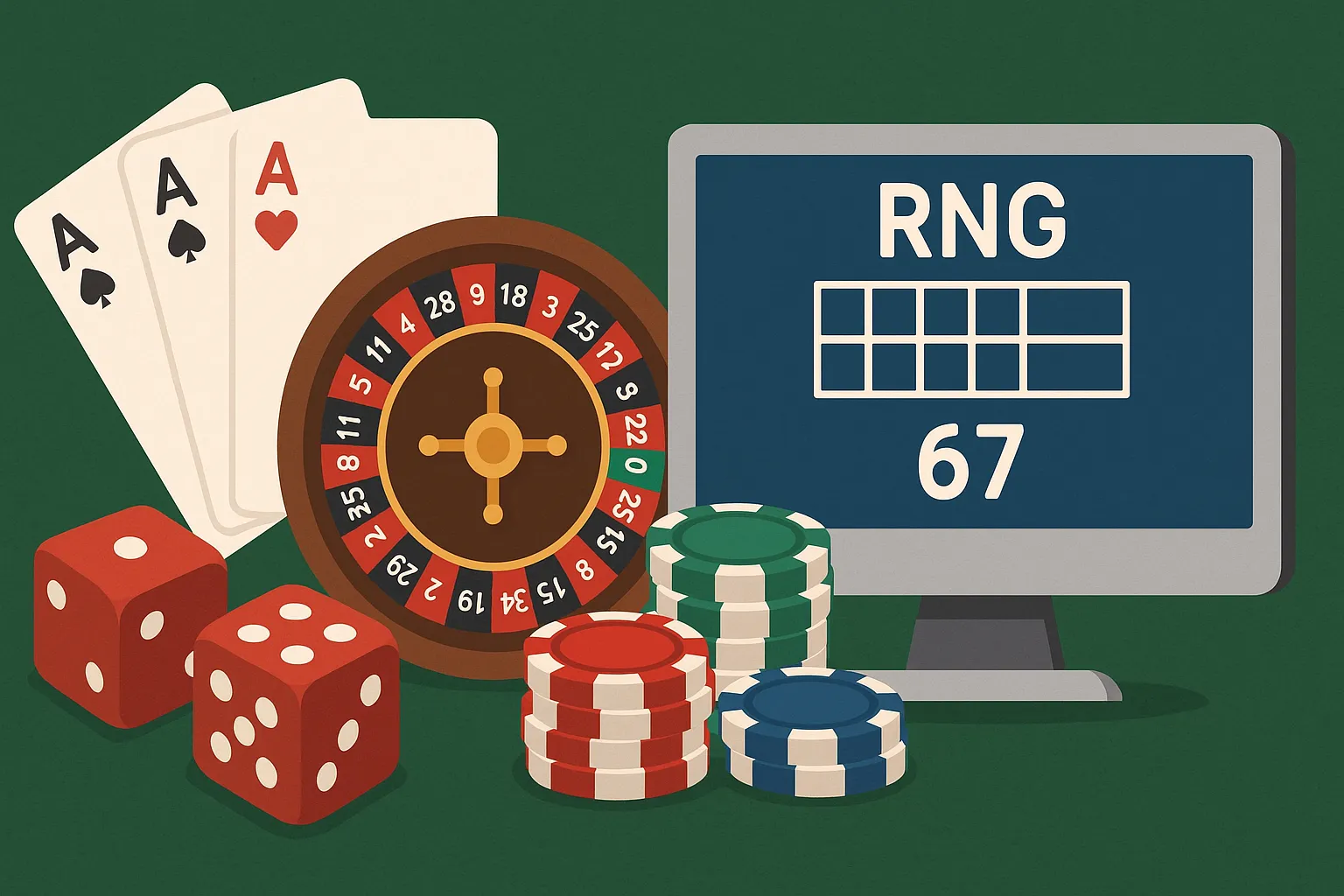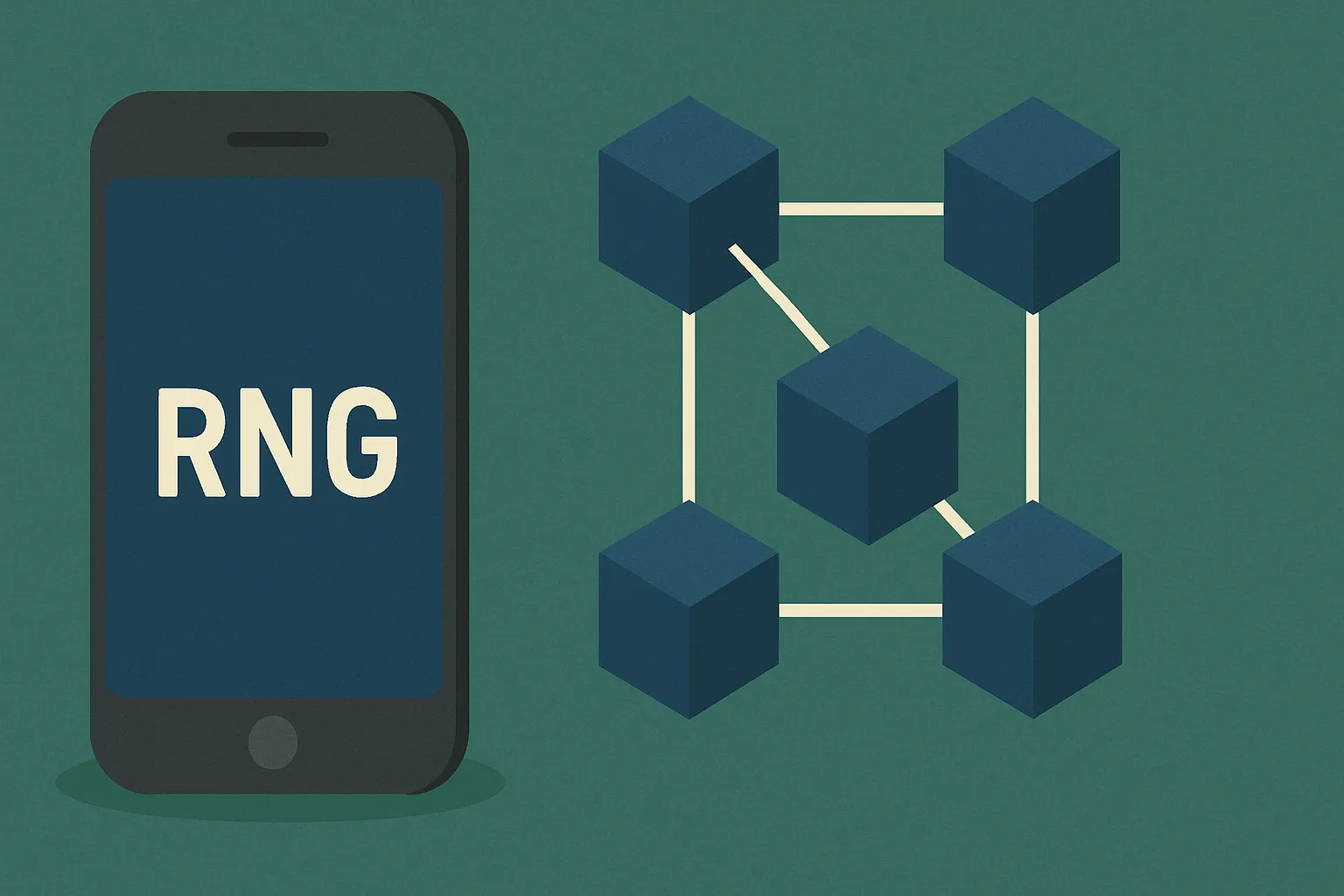There’s one key mechanism at the core of every online casino game that ensures fair play and unpredictability: the Random Number Generator. Be it the spinning reels of a slot machine or a bet placed on a hand of blackjack, RNG will determine the outcome in a manner that emulates worldly randomness. For players, that means every game is completely fair, unbiased, and fully unpredictable.
RNG becomes even more important in crypto casinos. Blockchain technology preaches transparency, and RNG systems are built to follow that. With the combination of RNG and provably fair systems, games at crypto casinos give players the confidence to know every spin, roll, or deal is completely random and free from manipulation.
Today we are about to get in detail and explain how RNG works and why it actually matters. We will explore the technology behind it and the different types of RNG too.
What is RNG?
The system of an RNG, or Random Number Generator, is designed to generate sequences of numbers or other outcomes that are genuinely random. In the case of an online casino, it indicates that the RNG guarantees to make every single outcome-whether a card dealt, a dice roll, or a slot spin-completely unpredictable and unbiased.
RNGs are used in online gaming for the purpose of replicating the randomness occurring in a traditional, physical game-for instance, shuffling cards in a blackjack game or the rolling of dice in craps. Without it, online games would be able to be manipulated, in which case players would not have faith in the platform.
Types of RNG
Pseudo-Random Number Generators (PRNG):
PRNGs are based on algorithms to generate randomness. They require a seed value-a starting number that the algorithm manipulates to produce a sequence of numbers that seem random.
While PRNGs aren’t truly random-because they’re based on some mathematical formula-they’re unpredictable enough for most online gaming situations.
True Random Number Generators:
Contrasting to this, TRNG uses natural phenomena for producing randomness It can be done through electrical noise, radioactive decay, or even atmospheric conditions.
TRNGs are genuinely random since their operation depends on physical processes, not algorithms.
RNG in Online Casino Games
RNG is a core element in all online casino games, ensuring fairness and randomness:
- Slots: RNG determines which symbols appear on the reels after each spin, ensuring no pattern or predictability.
- Table Games: The RNG decides where the ball lands in games like roulette or which cards are dealt in baccarat.
- Live Dealer Games: These are games that are conducted in real-time by real dealers, though RNG is still used to create randomization in some elements, such as shuffling cards in virtual games.
RNG ensures, in any of those cases, that the outcome is not at the discretion of the casino, player, or other environmental factor. This is particularly important in crypto casinos, where fairness-transparency is a keystone of their popularity.
How Does RNG Work?
RNGs are complex machines designed to generate completely unpredictable and random results. These sets of outcomes are what bring fairness to casino games since each of the outcomes of these results is unbiased, with no possibility of fraudulent interference.

The Algorithm Behind PRNG
The most common type of RNG systems used in online gaming is PRGN. While they are not actually random, PRNGs work to provide the appearance of randomness via complicated algorithms.
Seed Values and Algorithms: A PRNG begins with a seed value; this is the number that acts as the starting point in generating a sequence of numbers. The algorithm processes the seed value using mathematical formulas to produce a seemingly random series of outcomes.
For instance, a PRNG used in a slot machine could come up with something like 73829. Each number would correspond to the position of a reel and thus determines what symbols show up on the screen.
Constant Execution:
PRNGs run non-stop, creating new sequences in extremely short periods.
Whenever a player triggers an action-a press of the spin button, for example-the PRNG freezes on the current sequence and an outcome is realized instantly.
Example of RNG in Slot Games:
Imagine a five-reel slot game, each with 10 symbols. The PRNG generates one number to correspond to a particular symbol on each of the reels. Further, the algorithm ensures independence and probability of every spin for the fairest outcomes of all players.
True RNG in Blockchain Technology
While PRNGs are algorithm-based, TRNGs use natural phenomena to create randomness. In the world of blockchain, this is emulated through cryptographic means.
On-Chain RNG for Transparency:
- On-chain RNG is a common method that many blockchain casinos rely on, wherein the randomness is inherent in the blockchain.
- Data such as block hashes, timestamps, or details of transactions act as input for generating random numbers.
- These methods are both cryptographically secure and verifiable by players.
Provably Fair RNG Systems:
Crypto casinos incorporate provably fair algorithms to prove that their RNG is fair. Players are given a hash of the RNG seed before the game begins, which they can use to check that the outcome wasn’t changed after the game. For instance, if it’s a dice game, then the player will know the seed and the hash in advance to verify the roll was fair.
How RNG Ensures Randomness and Eliminates Bias
Because of this, manipulation is completely prevented in RNG systems, which ensures fairness in gaming.
- Unpredictable Results: The algorithms and cryptographic methods used in RNG make it impossible to predict the results of a game.
- Independence: Each outcome in a game is independent, ensuring that no patterns or biases can emerge.
- Tamper-Proof: In blockchain casinos, on-chain RNG makes sure that the outcomes are tamper-proof and transparent. PRNGs and blockchain
TRNGs are how RNG systems remain the backbone of fair online gaming.
Why RNG Matters in Crypto Casinos?
Random Number Generators are irreplaceable in maintaining the integrity of crypto casinos: they ensure fairness, build trust in, and make the players’ experience engaging.
Fairness Ensured
Fairness is the foundation of any decent casino. RNG ensures that every outcome is random; thus, it is impossible for either a casino or players to manipulate results.
For instance, in a game of roulette, RNG ensures that the place where the ball will fall is chosen randomly, keeping the odds of every spin fair. This fairness extends to all games, from slots and blackjack to poker, making sure that no player gets an unfair advantage.
Transparency through Blockchain
Crypto casinos go to the next level with the introduction of blockchain into their RNG mechanisms.
- Provably Fair Systems: Through hash values and seeds, players can independently verify the outcomes of the games. This reassures the players that the casino is operating honestly.
- Open Source Algorithms: Many crypto casinos publish their RNG algorithms, in which players can review and understand the mechanics behind each outcome.
Building Trust
Online gaming requires trust. In fact, new players consider this factor above all else when selecting an online casino. When it comes to every outcome, players are confident knowing it is left to a system that is unbiased.
Transparency via provably fair RNG systems solidifies the bond between players and the casino.
For crypto casinos, trust isn’t a benefit-it’s a competitive advantage.
Improving Player Experience
A trustworthy RNG system makes sure that every game is unpredictable and fun for the players.
- Unpredictability: RNG prevents patterns, thus keeping the players engaged.
- Consistency: Players enjoy consistent game play, knowing their chances of winning or losing are fair.
For example, in slot games, RNG makes each spin exciting because a big win is always just around the corner.
How RNG and Blockchain Work Together?
The integration of Random Number Generators with blockchain technology has completely changed the face of fairness in online gaming. By leveraging blockchain’s transparency and security, crypto casinos are able to offer players unparalleled trust in their games. Here’s how RNG and blockchain work together to create a seamless gaming experience:

Integration with Smart Contracts
Smart contracts are basically self-executing contracts where the terms of an agreement are written directly into lines of code, and in blockchain-based RNG systems, it’s also crucial.
How It Works: Smart contracts ensure randomness and automatic execution of RNG. n this way, when a game starts, the smart contract will either generate a random seed or fetch blockchain data to come up with a game outcome.
Transparency: A player can see the smart contract on the blockchain and trace how the random number was generated and that it is tamper-proof.
Provably Fair Systems
Provably fair systems combine RNG with player verification and unique in crypto casinos.
How it works: The casino generates, before the game begins, a server seed or a secret number and gives its hashed version to the player. Optionally, players can input their own seed, called the client seed, for added transparency. Together with blockchain data, these inputs determine the result of the RNG.
Player Verification
Using the hash and algorithm after the result is announced, players may verify that the outcome wasn’t tampered with. Casino tools allow players to verify the server and client seed to see if the resulting random number indeed corresponds to the game outcome given.
Examples of Blockchain RNG Systems in Popular Crypto Casinos
- BC.Game: The provably fair algorithms will let players verify every dice roll or card dealt using a hash and seed combination.
- Stake: Smart contracts are responsible for random number generation, ensuring transparency and tamper-proof results.
- FortuneJack: The RNG is mixed with blockchain data, such as transaction hashes, to create fair slot and table game results.
Crypto casinos ensure randomness, transparency, and verifiability by incorporating RNG into blockchain. The tooling is available for players to independently verify outcomes, creating confidence and trust in the fairness of every game.
Benefits of RNG in Crypto Casinos
The use of RNG is crucial to crypto casinos in order to provide players with a safe and fair gaming environment. Here are the key advantages of RNG in these platforms:
- Transparency: Blockchain-based RNG systems come with verifiable randomness that helps players trust in the fairness of their games. Players can audit game results using provably fair systems. Open-source algorithms let players review how outcomes are generated. Transparency ensures casinos operate with integrity, building trust among players.
- Safety: Crypto casinos design the RNG system to prevent hacking. Integrating blockchain assures that all outcomes are non-amendable by both the casino and the player. The smart contract automates the process of the RNG so that there can be no human interference. This level of security keeps players assured about the veracity of the games and their neutrality.
- Fair Odds: RNG ensures fairness because it uses unbiased results where every player has an equal chance to win. For example, in roulette, the RNG system makes sure that at any given moment, the probability of the ball landing on any number is uniform. The slots and table games all use RNG to make each spin or deal at least fair. It eliminates bias to create an equal playground for participants.
- Scalability: RNG systems mean crypto casinos can host slots and live dealer games side by side in great variability. Randomness is essential for games with complex mechanics, like progressive jackpot slots.
Challenges and Misconceptions About RNG
RNGs are the backbone of fairness in online casino gaming, but their implementation in crypto casinos comes with unique challenges and widespread misconceptions. It is important to understand such hurdles and find a way to address them for both players and platforms effectively
Misconception: RNG Can be Retriggered
Probably the most persistent of the myths surrounding RNG is that it can be manipulated to favor the house. While the concern may be valid in sites of less reputation, on crypto casinos, that integration of blockchain-based RNG systems keeps such risks nullified. The immutability of blockchain technology ensures that no RNG outcomes are tampered with in any way.
Furthermore, with provably fair systems, players are allowed to verify the authenticity of game outcomes to rid them of the idea of rigged results. For example, players can use the tools provided to match the hash of the original seed value with the outcome of the game for transparency, thereby reinforcing trust.
Proving Fairness to Players
Another important challenge is that, from a player perspective, the RNG needs to be proved fair to people who do not understand the intricacies of cryptographic systems. Most players are unfamiliar with such things as seed values, hashes, or how the mechanics behind a provably fair algorithm work. The gap creates skepticism, even for the most transparent casinos. To bridge this, crypto casinos are increasingly offering user-friendly verification tools and educational resources. These tools make the process of checking game fairness easier; players can check outcomes without requiring a lot of technical knowledge.
Technical Limitations and Scalability
Implementation of blockchain-based RNG systems also has a lot of technical challenges. Developing and maintaining such systems require advanced cryptographic competencies that are very costly, driving up the operational cost for casinos.
Besides, scalability issues arise during peak usages because high transaction volumes can slow down blockchain networks or increase fees. Casinos address these challenges by adopting Layer-2 solutions such as Polygon or Optimism to improve efficiency and reduce costs.
Cross-chain platforms further enhance this scalability by allowing seamless RNG execution on multiple blockchains.
By overcoming these challenges, crypto casinos have continuously updated their systems of random number generation, making them more secure, transparent, and accessible for players.
Final Words
The unsung heroes of online casino gaming are RNGs that ensure a game is fair, unpredictable, and full of excitement. In crypto casinos, RNG takes center stage and joins forces with the blockchain to create transparent, tamper-proof systems that give players an unparalleled level of trust in knowing that every spin, roll, or deal is fully random and unbiased.
More often than not, understanding this RNG mechanism enhances the gambler’s experience. That is, it de-sensationalizes the seemingly “random” nature of a particular outcome and demonstrates this technology’s ability to properly model the fairness of “real-world” games.
With the added layer introduced into cryptocurrency-based casinos, players can thus individually scrutinize game results for enhanced trust and accountability. An interactive element that is the sole domain of blockchain-backed platforms, setting them farther apart from traditional online houses.
Still, the challenges remain in the form of misconceptions over the manipulation of RNG and the complexity of explaining technical processes to players.
Crypto casinos try to solve these issues by implementing user-friendly verification tools, educational resources, and scalable technologies such as Layer-2 networks. In this way, RNG would be just as accessible and efficient when blockchain gaming continues to grow in popularity.
The future of RNG in crypto casinos is bright. Fairness and transparency will be further elevated by the use of enhanced cryptographic methods, cross-chain integrations, and decentralized systems. Players will have more control over their gaming experience with tools to verify results themselves and even participate in maintaining the integrity of the platform. Inclusion of emerging trends like AI and quantum-resistant algorithms cements RNG’s place even more as a cornerstone in online gaming.
RNG is not just a randomness mechanism; it is a sign of fairness and trust in an industry based on entertainment and chance. For crypto casinos, RNG is a commitment to secure, enjoyable, and transparent gaming experiences for players. As technology continues to evolve, RNG will remain a vital component of this exciting and dynamic industry.


